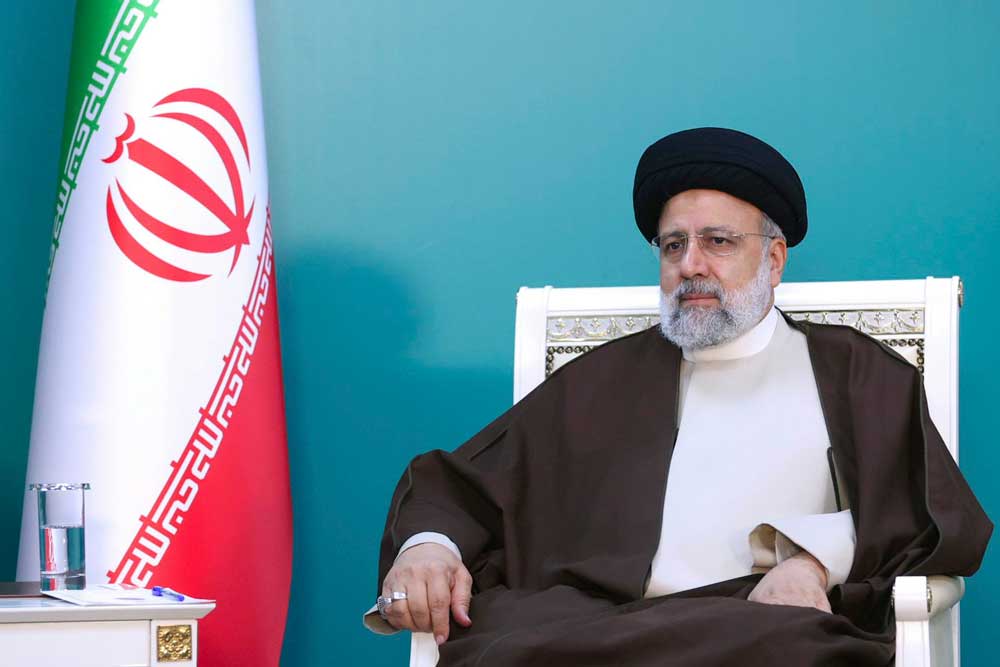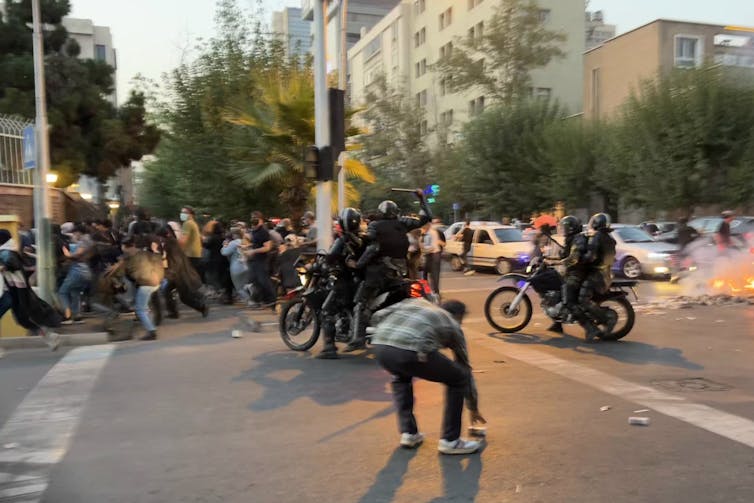
By Eric Lob
Iranian President Ebrahim Raisi, who was killed when his helicopter crashed on May 19, 2024 in a mountainous border region, was a consummate loyalist whose passing will be a severe blow to the country’s conservative leadership.
The discovery of wreckage and bodies followed an overnight search operation hampered by weather and terrain. Iran’s Supreme Leader Ayatollah Ali Khamenei announced that there would be a five day period of public mourning in the country.
As an expert on Iran’s domestic politics and foreign policy, I believe concern in Tehran may extend beyond the potential human tragedy of the crash. The change forced by it will have important implications for an Iranian state that is consumed by domestic chaos, and regional and international confrontation.
Who was Ebrahim Raisi?
Since the Iranian Revolution of 1979, Raisi acted as an assiduous apparatchik of the Islamic Republic and a prominent protégé of Khamenei, who as supreme leader holds ultimate power in the Islamic Republic.
Before becoming president in 2021, Raisi held various positions inside the judiciary under the purview of the supreme leader. As a prosecutor, and at the end of the Iran-Iraq War in 1988, he sat on the committee that sentenced thousands of political prisoners to death.
The executions earned him the nickname the “Butcher of Tehran” and subsequently subjected him to sanctions by the United States and to condemnation by the United Nations and international human rights organizations.
Since 2006, Raisi served on the Assembly of Experts, a body that appoints and supervises the supreme leader.
And despite being seen as lacking charisma and eloquence, it was thought that Raisi, 63, was being groomed to succeed the 85-year-old Khamenei as supreme leader.
A checkered domestic record
Domestically, Raisi’s presidency was both the cause and consequence of a legitimacy crisis and societal chaos for the regime.
He controversially won the 2021 presidential election after a high number of candidate disqualifications by the Guardian Council, which vets candidates, and a historically low voter turnout of less than 50%.
To appease his conservative base, Raisi and his government reinvigorated the morality police and reimposed religious restrictions on society. This policy led to the Women, Life, Freedom protests sparked by the death in police custody of Mahsa Amini in 2022. The demonstrations proved to be the largest and longest in the Islamic Republic’s near 50-year history. They also resulted in unprecedented state repression, with over 500 protesters killed and hundreds more injured, disappeared and detained. Throughout the protests, Raisi demonstrated his loyalty to the supreme leader and conservative elites by doubling down on restrictions and crackdowns.

AFP via Getty Images
Meanwhile, under Raisi, Iran’s economy continued to suffer due to a combination of government mismanagement and corruption, along with U.S. sanctions that have intensified in response to Tehran’s domestic repression and overseas provocations.
Confrontation over rapprochement
Domestic turmoil under Raisi’s presidency was accompanied by shifts in Iran’s regional and international role.
As supreme leader, Khamenei has the final say on foreign policy. But Raisi presided over a state that continued down the path of confrontation toward its adversaries, notably the U.S. and Israel.
And whether out of choice or perceived necessity, Tehran has moved further away from any idea of rapprochement with the West.
Faced with increased U.S. sanctions, Iran under Raisi has been reluctant to revive the nuclear deal. Instead, Iran has increased uranium enrichment, blocked international inspectors, and become a nuclear threshold state.
Raisi also continued the “Look to the East” policy of his predecessor, Hassan Rouhani. To this end, he and his government pursued greater rapprochement with China.
Beijing, in turn, has offered an economic lifeline by importing Iranian oil and brokering a diplomatic agreement between Iran and Saudi Arabia in March 2023.
Meanwhile, under Raisi’s presidency, Iran continued to serve as an ally and funder of anti-US and anti-West conflicts, delivering combat drones to Russia for use in Ukraine and providing arms to various regional proxies in the Middle East.
Since the war in Gaza began on Oct. 7, 2023, Iran under Khamenei and Raisi had maintained a delicate balance between enabling its regional proxies to counter Israel and the United States while avoiding a direct confrontation with both countries, who are conventionally superior foes.
This balance was momentarily disrupted when the Islamic Republic directly attacked Israel with drones and missiles for the first time in history in April in retaliation for a strike on Iran’s consulate in Damascus.
Raisi – although not directly responsible for foreign policy – had been a key supporter of the Iranian regime’s attempts to further distance itself from the established international order and seek alliances with countries similarly antagonistic toward the West.
At the time of the helicopter crash, Raisi and his colleagues were returning from a dam inauguration ceremony held in neighboring Azerbaijan. The ceremony was presumably intended for Iran to ingratiate itself with Azerbaijan, having earlier taken an ambiguous, if not adversarial, position in the Nagorno-Karabakh conflict – which ended in a convincing Azerbaijani victory in late 2023.
What a change in president could mean
In Raisi, Supreme Leader Khamenei had a longtime loyalist, regime insider and a prospective successor.
Under the Iranian constitution, any death of a president results in the first vice president serving as interim president. In this case, that means Mohammad Mokhber, who is a politician much in the same making of Raisi, and who has been a prominent member of the Iran team negotiating weapons deals with Moscow.
Iran will also have to hold presidential elections within 50 days. It remains to be seen who the supreme leader would give the nod to as a future president and potential successor.
But it is all but certain that conservatives in Tehran will continue to circle the wagons, given the internal and external pressure they face.
Domestically, this could take the form of greater state repression and election manipulation. Regionally and internationally, I believe it could mean forging stronger ties with budding allies and pursuing calculated confrontation against traditional adversaries.
![]()
Eric Lob is Associate Professor of Politics and International Relationsat Florida International University.





























Pogo says
@Air quality of the entire planet was immediately improved
A voice of experience:
Face The Nation
Transcript: Former Defense Secretary Robert Gates on “Face the Nation,” May 19, 2024
https://www.cbsnews.com/news/robert-gates-former-defense-secretary-face-the-nation-transcript-05-19-2024/
Hippy says
Things surely would have been different if the UN would have put an arrest warrant out after the Butcher of Baghdad. (for some of you I am sure need that explained to you. That was sarcasm indicating that the UN and it’s decelerations are feckless)
Atwp says
Was this an accident? Did the two friends have something to with the supposed crash?
JimboXYZ says
Biden will be more than happy to welcome the next regime into power. Biden offered his condolences recently, he’s just playing Middle East politics for the next regime. Bidens for Israel, he’s pro Palestinian & now he’ll be the next regime pro Iranian.He’s pro China too, but for an 18% tariff in the name of competition ? A tariff is not competition, competition would mean the USA would have to compete with Chinese steel. Instead we’re getting the continued gouging of inflation on consumers. If China can legitimately lower prices, in a competitive world the competition would lower their prices too ? The reality is that American Corporations are still going to China for farming out products for maximum profitability for markups. The tariff only raises prices for something that is still going to be made in China that will be marketed & priced up as if it were made in the USA.
Jim says
China lowers prices by paying their employees a fraction of what US workers make. We can get competitive if we cut our pay as well. I wonder how willing you would be to take a pay cut to “be competitive”.
Biden has done nothing to indicate he’s “pro-Iran”. But maybe Fox News says that he does.
By the way, Trump is the one who instituted tariffs on China before Biden did. Does that bother you at all or is it wrong when Biden does it and right when Trump does it? I’m sure you are okay with anything Trump does or did. But keep living in your world of make-believe. If you ever stopped for a minute and got your facts straight on anything, I’ll bet your little mind might explode.
Hippy says
[Please comply with our comment policy. You’ve been cautioned several times before. If you persist in telling us how and what to report, you’ll be banned. Thank you.–FL]
and still no articles about these animals….. yet we worry about California thinking that taxing the sale of guns is going to cut down on crime. Priorities????
https://www.dailymail.co.uk/news/article-13451089/The-father-son-Hamas-rapists-Terrorists-going-house-house-carrying-sex-attacks-murder-One-screamed-cried-father-raped-did-cousin-did-father-killed-her.html